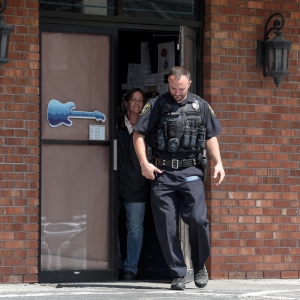Dartmouth to pitch plans for West Wheelock housing project

Sam Schwinghammer, of engineering firm VHB, packs up his equipment after surveying points along West Wheelock Street in Hanover, N.H., for Dartmouth College on Wednesday, Feb. 21, 2024. Dartmouth College will present a plan to the Hanover Planning Board in March to build a 290-bed undergraduate housing building on a nearby property. (Valley News - James M. Patterson) Copyright Valley News. May not be reprinted or used online without permission. Send requests to permission@vnews.com. Valley News - James M. Patterson
| Published: 03-02-2024 7:28 PM |
HANOVER — Dartmouth College administrators will meet with the Hanover Planning Board on Tuesday to discuss a proposed housing project on West Wheelock Street which would provide “apartment-style units” for approximately 190 undergraduate students on a college-owned property near the intersection with Engineering Drive.
Josh Keniston, senior vice president of Capital Planning and Campus Operations, said last month that the college is currently seeking feedback from town planning officials on a project at 25-27 West Wheelock Street, a corridor providing an entry from Interstate 91 and Norwich into Hanover and the Dartmouth campus.
Tuesday’s meeting will be an informal discussion with the Planning Board to share the college’s current design proposal and to answer questions from board members, Keniston said.
“We will still present (preliminary) site plans and design layouts, but it’s going to be more of a narrative presentation and an opportunity to receive feedback (from the town),” Keniston said.
Though the design is still in a preliminary phase, each apartment will contain three to four beds, a kitchen and a common living area, Keniston said in a phone interview. The proposed architecture will incorporate a mix of natural stone, brick and wood to give the building a “New England aesthetic” and the building will achieve a carbon-neutral energy output, in part through insulation and a design of windows that will maximize the apartments’ access to natural light.
The property currently contains three two-story apartment buildings, which Keniston said will likely be demolished before construction begins. These buildings have been vacant since early January.
The new residence will provide housing for students who are displaced while the college attends to extensive renovations of several residential halls on campus.
“Sixty percent of our current beds (in on-campus residential buildings) will be affected by deep renovations that will take between 7 to 12 years (total) to complete,” Keniston said.
Article continues after...
Yesterday's Most Read Articles
These buildings include the 300-bed Choate cluster, 250-bed Massachusetts Row and 230-bed Fayerweather Hall. Each renovation will take up to two years to complete and will involve upgrading the heating, ventilation and cooling system, replacing fire and safety equipment and improving overall energy efficiency.
With the undergraduate project moving to West Wheelock, Dartmouth plans to use property owned on Lyme Road, which was once part of the college’s golf course, as graduate school housing.
Dartmouth had initially planned to house undergraduate students on Lyme Road, where the college was seeking town permits to build a 397-bed residential complex on college-owned land. The project received approval last year from the Zoning Board of Adjustment despite heavy push-back from town residents, who contended that a large-scale residential complex would pose traffic safety concerns and have a negative impact on the neighborhood.
Keniston said the college is currently re-evaluating the Lyme Road site plan to determine if design changes are needed.
Graduate students tend to have different needs from undergraduates, or in some cases have families, which may require different types of living spaces or amenities, Keniston noted.
Keniston said there is not currently a timeline for the completion of the graduate student project review.
The college hopes to have town approval of a final site plan for the West Wheelock project this summer so that construction may begin in the fall, Keniston said.
In addition to the Dartmouth project awaiting permitting approval, the Hanover Planning Board approved a plan last year for construction of a 19-unit apartment building for up to 91 residents at 14 West Wheelock Street.
The property owner, Jolin Salazar-Kish, a Hanover-based developer, said last month that she was still soliciting bids from contractors to build the project and acquiring construction materials. A start date for construction had not been determined.
In anticipation of housing growth on West Wheelock Street, town administrators are exploring tools to finance improvements to public infrastructure to accommodate a future increase in residents.
At a Feb. 5 Hanover Selectboard meeting, Planning and Zoning Director Rob Houseman presented a proposal to designate the West Wheelock Street corridor — from its end at Ledyard Free Bridge to its intersection with North Main Street — a Tax Increment Financing, or TIF district.
Tax Increment Financing is a funding method in which a municipality pays for infrastructure improvements to a designated area by capturing the tax revenues generated from increases in the area’s property value.
Houseman told Selectboard members that the town seeks to make substantial improvements to West Wheelock Street to support potential new housing projects, including new drainage systems to treat water being discharged into the Connecticut River, new pedestrian and bicycle paths and street lighting, the burial of utility lines, and landscaping and aesthetic improvements.
“We need to make sure the sidewalks and bike paths meet the (new) users’ needs … and to treat and filtrate stormwater runoff to make sure that whatever goes into the river is clean water because it’s a resource for all of us,” Houseman said in a phone interview last week.
The Selectboard is currently considering whether to place the TIF proposal on the town warrant for consideration by voters at Town Meeting in May.
The warrant article would ask voters to approve the creation of this district and authorize the Selectboard to oversee the development of an infrastructure improvement plan.
This infrastructure plan will include individual cost estimates for each recommended project. Any bonds proposed as a result of this plan would also need approval from town voters, Houseman said.
The Planning Board will meeting with Dartmouth College staff on Tuesday, March 5 at 7 p.m. in Town Hall.
Patrick Adrian may be reached at padrian@vnews.com or 603-727-3216.






 After more than 45 years, Upper Valley guitar shop closes
After more than 45 years, Upper Valley guitar shop closes On the trail: Gov. Ayotte says she delivered on her promises in her 100 days in office. Not everyone agrees
On the trail: Gov. Ayotte says she delivered on her promises in her 100 days in office. Not everyone agrees Windsor snow globe business fears Trump tariffs
Windsor snow globe business fears Trump tariffs Fill ’er up: New Hampshire considers allowing patrons to pour their own alcohol
Fill ’er up: New Hampshire considers allowing patrons to pour their own alcohol 
